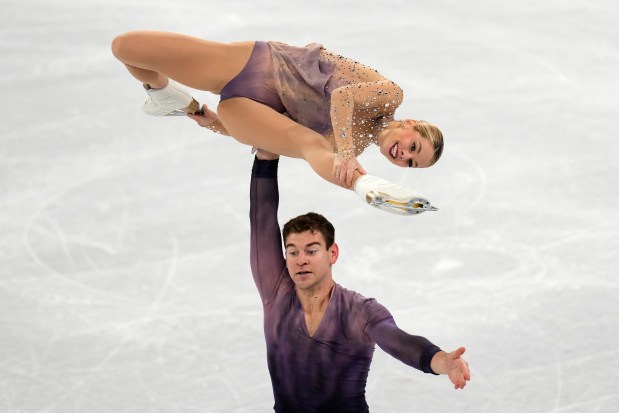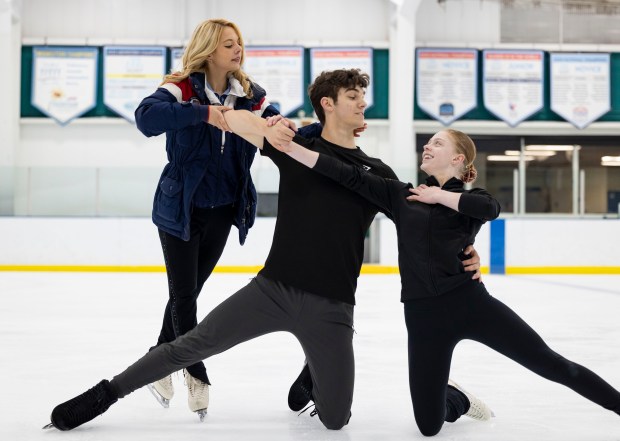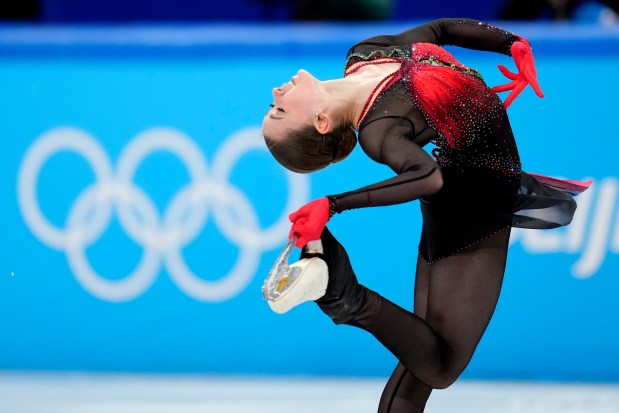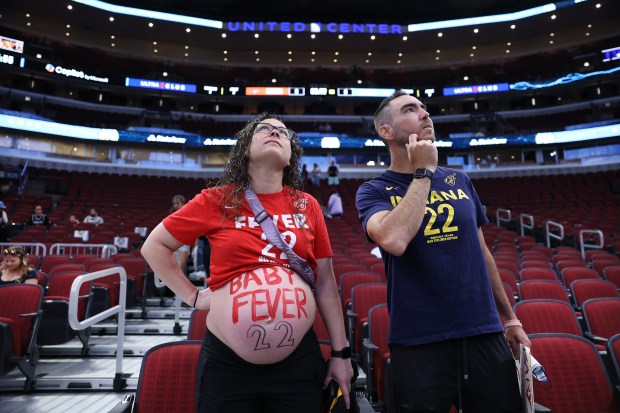PARIS — It has been 902 days since Addison native Alexa Knierim and her teammates medaled in the team figure skating event at the Beijing Winter Olympics.
In that time, she has won a world championship in pairs skating, gone on tour, retired from competition, moved back to the Chicago suburbs and started a coaching career.
And yet she still hasn’t received her medal.
As the Paris Summer Games began Friday with a historic opening ceremony along the Seine River, a headline-grabbing controversy from the previous Olympics was finally resolved.
The Court of Arbitration for Sport rejected an appeal Thursday involving the disqualification of Russian figure skater Kamila Valieva, who tested positive for a banned substance at a national competition shortly before the 2022 Beijing Olympics. Her doping violation became public after Russia was declared the winner of the team figure skating event, beating the United States and Japan for the top podium spot.
The ruling means the U.S. squad — which includes Knierim and her partner Brandon Frazier — will be awarded the gold medal, with Japan moving into the silver spot. The court is still considering a dispute as to whether the bronze should go to Canada or the Russian skaters other than Valieva.
In the wake of the court’s ruling, U.S. Olympic and Paralympic Committee announced the American team would receive their medal at a special ceremony during the Paris Games.
The details have not yet been finalized, though it’s likely to take place at Champions Park at the foot of the Eiffel Tower. The park, which is open to the public, is hosting nightly “athlete parades” throughout the Games to honor the previous day’s medalists.
“We are thrilled to finally honor these incredible athletes,” USOPC CEO Sarah Hirshland said in a statement. “As we finalize the details of the award ceremony in collaboration with the International Olympic Committee and U.S. Figure Skating, we will share updates as soon as they are confirmed. We are especially excited that the beautiful city of Paris will join us in this celebration.”
It’s believed to be the first time a Winter Olympics medal has been awarded at a Summer Olympics.
As Valieva, then 15, and the Russian Olympic Committee tried to hang on to the medal in Beijing, they insisted the positive test was the result of her grandfather accidentally putting his heart medication into a strawberry dessert he served her.
Amid questions about her level of culpability given her age, the IOC did not hold a medal ceremony for the team event in Beijing. Instead, organizers gave the U.S. team empty medal boxes with a promise to fill them as soon as the winner was sorted out.
This past January — some 271 days later — the Court of Arbitration for Sport upheld a decision banning Valieva from figure skating for four years, backdating her suspension to December 2021. The International Skating Union responded by awarding the gold medal to the United States.
In the ruling’s immediate aftermath, a plan to award the skaters their medals at the 2024 Summer Games took shape. It remained in limbo, however, pending the outcome of the Russian team’s appeal.
For Knierim — who competed in Beijing with Frazier — the Paris ceremony represents both something she rightfully won and an opportunity that she forever lost.

The ceremony, she says, cannot re-create that magical feeling when an athlete realizes they’ve achieved a lifelong dream and they stand atop a podium with their teammates as the national anthem plays. Still, she wants to participate in the event so she can send a message to the world’s athletic community.
“Getting the medal means that we are still striving for integrity in our sport, so I think that’s important and significant,” she said. “I don’t see it as a second chance to experience what we would have felt if we had the ceremony right after our competition. That moment has been taken away and it’s no longer about that.”
The U.S. figure skating team won’t be the only athletes to receive medals from a previous Olympics at these Games.
The IOC will hold a so-called medal reallocation ceremony for 10 track athletes from the 2012 Olympics who had their placements upgraded after it was determined Russian athletes tested positive for doping.
“It’s a great idea,” said Northwestern University law professor Daniel Gandert, an expert in international sports arbitration. “In the past, there have been people who’ve gotten medals that they should have received earlier because of doping in food courts and other non-ceremonious places.”
The Court of Sport Arbitration is a notoriously deliberate tribunal, so it’s not unusual for a 2-year-old matter to be unresolved, Gandert said. The process is designed to protect the accused athlete’s rights, he said, but that intentional approach can often come at the expense of athletes like Knierim who followed the rules.
“What I think the Court of Arbitration for Sport does a great job of is really trying to get everything right regarding the rules,” Gandert said. “But when a dispute breaks out, it’s not abnormal for it to be years for athletes to get their righteous medal — and that’s something I think they need to do a better job of.”
The delay likely has come at a significant cost to Knierim, given the very short window for a U.S. pairs skater to financially benefit from a team gold medal. At one time, she had dreamed of competing on “Dancing with the Stars,” but she realizes a new crop of 2024 Olympians will make her chances even smaller.
“If you’re a gold medalist all of a sudden there’s interest,” she said. “Anything lower than that, nobody really cares. And, I’m sorry, but if we get the gold medals two-and-a-half years later, companies are not going to care. So all of our opportunities to get more money, exposure or experiences were robbed. The damage is done.”
Fortunately for Knierim, she has found purpose in her post-Olympic coaching career. She has joined the staff at the Park Ridge-based Oakton Edge Skating Academy, where she teaches skaters of all ages and skill levels. The toddlers, she says, are the most fun because they have no clue about her skating resume and are too young to be intimidated by her or watch her old routines on YouTube.

The transition from elite athlete to coach wasn’t as easy as Knierim envisioned. It took her a few months to realize that not every skater can — or needs to — be as driven as she was.
“I strive to find the balance between being strict and uplifting,” she said. “But I know if my kid can achieve it, I’m going to make sure I push them in a healthy way for them to achieve it. I know what their goals are and it’s my job to help them succeed. I know that they’ll be happy when they achieve their goals as long as I’m pushing them in a healthy and respectful way.”
In her new job, she works closely with her husband and former skating partner, Chris Knierim, the three-time national champion pairs skater with whom she won Olympic bronze in the team event at the Pyeongchang Games in 2018. He retired from competition in 2020 and later became director of skating at Oakton Ice Arena in Park Ridge.
The couple — the first Americans to successfully perform a quad twist in Olympic competition — hope to transform Oakton Edge into a go-to training center for elite pairs skaters. They currently coach two competitive pairs teams and expect their roster to grow when the Oakton arena reopens next year following a state-of-the-art renovation.
Until then, they’re coaching all disciplines — including synchronized skating — at rinks across the north suburbs.
“Chris just has a super strong passion for coaching,” she said. “He wants to travel and he wants to make every kid who wants to try pair skating feel like they can do it. We both want to make it more accessible.”
As coaches not far removed from their competitive days, Knierim says, they can show students proper technique instead of just telling them. Chris can lift or throw a female student so she understands what it feels like when a move is executed correctly, while Alexa can partner with a male pupil and do the same thing.
And, of course, they can pair up together and show their teams how it’s done.
“I love collaborating with Chris and strategizing how to make each kid better each day,” she said. “I love being able to work alongside him every day again.”
In Alexa Knierim’s new life, the dream is about helping others get medals. So much so that she’s somewhat indifferent to the gold one she has earned but not yet received.
“That gold medal moment has passed,” she said after a recent coaching session. “Our students, our club, our coaching are our future.”





